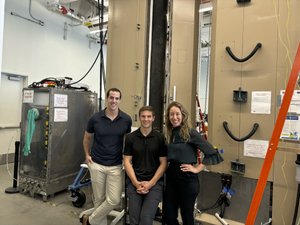
Serial entrepreneur and investor Dave Balter knows that running a startup can sometimes feel like rowing a boat in the middle of the ocean.
He also knows that with everything constantly moving, as it does in the startup world, it can be difficult to lose sight of the people around you—and to stay humble.
"I was a tyrant. I fell into the trap of believing what I read or believing what people told me," Balter said. "It really took a lot of pain, a lot of reality setting in, to realize that that was just a moment. Sometimes you're on a successful tear, sometimes not. And it wasn't really about me. It was about everybody else who helped make that journey possible."
In a collection of essays titled "The Humility Imperative: Effective Leadership in an Era of Arrogance," Balter chronicles his journey from the sale of his fourth startup, BzzAgent, through the launch of three additional startups: Smarterer, Mylestone and Flipside Crypto, where he is now CEO. He also writes on his time as a corporate executive and as a partner in a venture capital fund.
"The Humility Imperative" is available for purchase here on Amazon, or contact your local bookstore. BostInno readers can also access a secret site, with many of the original articles that fueled the stories, here with the code "humility."
We caught up with Balter to talk about the book, his evolution as a leader and how Boston's startup community has changed over the last decade. This interview has been lightly edited for length and clarity.
Why don't you start by walking me through the process of pulling all these essays together in one place?
Sure. So the essays comprise about 10 years of writing, from around the sale of BzzAgent all the way through late 2019, early 2020. The idea was stimulated by suddenly realizing that these stories really represent the arc of an entrepreneurial journey, during a time of pretty deep reflection, post a pretty successful sale, then trying to figure out what to do from there. As I started going through them, I realized it wasn't really effective to use them chronologically. It's not meant to be the arc of the typical business journey—learning, crisis, pain, suffering, great outcome, rah rah. It wasn't really meant to be that.
I thought it would be more useful to frame the book almost by two things. One, the flow of how a startup feels, like a rowboat in the middle of the ocean, just constantly being batted about through gears shifting, through massive failures, massive successes, communications between peers and managers and board members and then recruiting, and ex employees, everything is constantly moving. The first view was, how do I pull them together to feel like a startup feels?
The second view was to try to put the pieces together to reflect that everything is really about the people that surround you in one of these companies. And it's not just internal. The book opens with a story of my wife and ends with a story of my wife. In the middle is a story of a divorce. Then, all throughout, there's little tidbits on recruiting, there's tidbits on ex-employees, there's tidbits on board members and investors. It's really that reflection. The ability to achieve is really designed through your ability to engage with these disparate people while just trying to keep your sanity and move forward. I tried to put it together to reflect those two things.
I think that everybody has a little bit more time to reflect on their own lives right now, given that we are still in the midst of a global pandemic. When you were going back and rereading some of these older essays, what struck you about how you've changed?
The first and most major change is why I've titled the book "The Humility Imperative." Before even the first story was written in this book, I mean, I was a tyrant. I fell into the trap of believing what I read or believing what people told me. BzzAgent had a very meteoric rise. You know, you get put on the cover of The New York Times Magazine, you get paid to speak at a conference, you're hobnobbing with Jack Welch in the back room—I couldn't see anything except my own worth in that. It really took a lot of pain, a lot of reality setting in, to realize that that was just a moment. Sometimes you're on a successful tear, sometimes not. And it wasn't really about me. It was about everybody else who helped make that journey possible.
The heart of that story, of almost losing a company and finding humility and getting out the other side, is the most significant change. BzzAgent was really coming part at the seams. We had done three layoffs. We were getting crushed by social media. Someone told me to go join a CEO group. So I said, O.K., maybe I'll try that. I went to the CEO group, and in this group were Brian Halligan from HubSpot, Art Papas from Bullhorn, Colin Angle from iRobot and Janet Kraus from Peach. All these amazing talents. I went, and they literally, afterward, said, "We almost didn't let you in. You were such a nightmare. Everything we suggested, you said, was wrong. You'd tried everything. You knew everything." At one point, Russ Wilcox, who is one of the CEOs in the group, said, "The reason we let you in is that we decided it was part of our journey to help you. You were in such dire straits and couldn't see through the trees."
That always stuck with me. That was the moment I was at the bottom. This group of amazing CEOs looked at me and said, "You're not seeing it. You're going to fail your company." They took a chance and let me in. That completely transformed my business and helped it reengage and get to the outcome.
What do you think has changed about the startup community since you've published some of these essays?
Well the startup community in Boston has definitely changed. It was sort of an era around 2012, 2013, where Techstars was really taking off here and there was a crop of young companies that were really beginning to take shape. It felt like a community. Now, it feels like a group of disparate parts. It feels more mature, in a way. The Wayfairs and HubSpots of the world, these were startups that became real companies. But I find it's less a community here at this point. I think part of it is that online presences and social and all the tools to stay connected digitally have enabled everybody to build relationships that aren't, like, "Let's all go spend some time together in this location." We can't with Covid now anyway, but even before that, it wasn't the same. It felt like ships passing in the night, often. I feel like the startup community has energized well in Boston, but it has transformed from a community into a group of disparate parts that are occasionally passing by each other.
I feel like that's the same kind of thing that a lot of folks would say about a startup that has since become a more mature, large corporation.
Maybe that's it. Maybe you could look at the startups as like, an organism or an organization, and it's matured to a point where it no longer needs to like perform the most foundational tasks of building the basic relationships. Maybe that's a sign that it's matured here. Personally, I miss the 2012 community. It felt like you could go anywhere and there'd be massive amounts of support, no matter where you are in your journey. Now, I feel like it's a race to position yourself in a certain way online to show you're doing X. It's all about what perspective you want to deliver to the market. It's just a different world now.
Do you think it's better in some ways?
Yeah, I was going to say, I don't know that that's the most positive of views. Do I think it's better? I think it's different. I feel the talent has become more capable. That's really positive. I look around the community and I see all these amazing people, like David Cancel and Jody Rose, all these amazing people doing real things.
It's almost like, when you're in high school, you almost miss middle school a little bit. The innocence of middle school. This era is full of developing companies and powerful, important outcomes. But it's hard to not look back and miss the innocence of some of the earlier days when we could all just try to build the base together.
Throw a tech prom.
Yeah, throw a tech prom. We did two tech proms. We get asked a lot, "Are you guys going to do another tech prom?" And the answer is invariably, "It feels like that's a different era." We love that era. We love this era. But the tech prom was a different time.

Well, thank you so much. Was there anything else that you wanted to add?
You said when you were reading, you zoomed in on a few paragraphs. Were there any of those that stuck to you or anything you think would be useful for readers?
I'm definitely going to revisit "33 Boston-Area CEOs and Their Differences" and the bits about the types of VCs you'll meet.
I think the intent of a chapter like that, it's definitely a shout-out to the Boston community, but it's also, there's no one type of leader that's successful. It's a variety of types and frankly some quirks and unique behaviors, which is what probably presents the opportunity to create some form of success.
To succeed in today's startup era, you need a set of arrows in your quiver. You need to know how to fundraise. You need to know how to recruit talent. You need to know how to inspire employees through confidence, but also recognize that they have choices. All these people around you have lots of choices. If you're not continuing to spearhead the mentality of humility and really listening, they're going to go to other places. They're going to find other opportunities that are more fulfilling. Frankly, Covid's made that idea even sharper. I don't think people have a lot of time to want to surround themselves with people that don't inspire them or don't let them identify their great strengths and deliver on that.
It'll probably be the silver lining of Covid, that the startup world is forced to really embrace the idea that humility from all areas of the ecosystem is what's going to make things actually turn out positively in the end.








